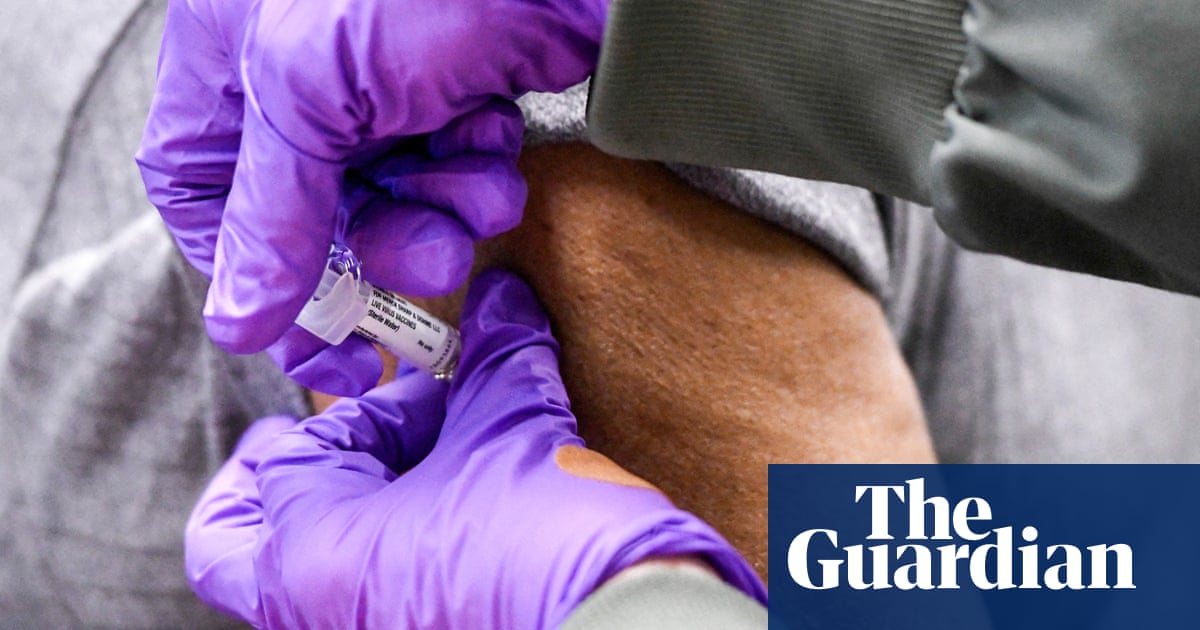Health secretaryRobert F Kennedy Jrand his department have made a series of misleading statements that alarmed vaccine experts and advocates in recent days – including that the measles, mumps and rubella (MMR) vaccine includes “aborted fetus debris”.
Health department officials released statements saying they could alter vaccine testing and build new “surveillance systems” on Wednesday, both of which have unnerved experts who view new placebo testing as potentially unethical.
“It’s his goal to even further lessen trust in vaccines and make it onerous enough for manufacturers that they will abandon it,” said Dr Paul Offit, an expert on infectious disease and immunology and director of the Vaccine Education Center at Children’s Hospital of Philadelphia, about the statements and Kennedy. “It’s a fragile market.”
In this same week, Kennedy extolled parents to “do their own research” in atalk show interview– the phrase has become pop culture shorthand for a shallow internet search that casts people into the arms of the disinformation ecosystem.
“All new vaccines will undergo safety testing in placebo-controlled trials prior to licensure – a radical departure from past practices,” an HHS spokesperson told the Washington Post, in response to questions about general vaccine policy and the measles vaccine. The department did not clarify what it meant by “new vaccine”.
The department spokesperson also described new surveillance systems for vaccines, “that will accurately measure vaccine risks as well as benefits – because real science demands both transparency and accountability”, but did not elaborate on the design of those systems.
Prior to being confirmed to the role of health secretary, Kennedy was arguably the nation’s most prominent anti-vaccine advocate and led a non-profit known forprolific misinformation. He alsoearned moneyby referring clients to law firms suing vaccine makers.
Among the claims Kennedy spread was that medications cause “autoimmune injuries and allergic injuries and neurodevelopmental injuries that have long diagnostic horizons or long incubation periods, so you can do the study and you will not see the injury for five years”, he said in an interview in 2021, according to reporting by the Post.
Kennedy also claimed this week that the MMR vaccine includes “aborted fetus debris”. The rubella vaccine, like many vaccines, is produced usingdecades-old sterile fetal cell linesderived from two elective terminations in the 1960s, including the rubella vaccine.
Vaccines against new pathogens, such as Covid-19, are placebo tested. However, experts consider new placebo-controlled trials for long-time vaccines, for instance measles, to be unethical because it would effectively deny a patient a known intervention while potentially exposing them to a dangerous disease.
“No institutional review board at any academic center would ever accept that – so he’s asking what personal injury lawyer invariably asks for, which is the impossible to be done,” said Offit.
Although Kennedy has made false and misleading statements about vaccines generally, the Covid-19 vaccine appears to be especially in the administration’s crosshairs.
In response to recentquestions about Covid-19 strategyfrom the Guardian, the administration responded: “The Covid-19 pandemic is over, and HHS will no longer waste billions of taxpayer dollars responding to a non-existent pandemic that Americans moved on from years ago.”
Health officials have reportedly required all research grant applications on messenger RNA technology, which powers most Covid-19 vaccines, beflagged to Kennedy’s office. They have also ended research that tested for the Covid-19 vaccine’s safety and efficacy in special groups, such as pregnant women, as part of an$11bn clawbackin grants from states.
Most controversially, the Food and Drug Administration has delayed expected approval of a new Covid-19 vaccine from Novavax, reportedly on the review of a political appointee known to be skeptical of vaccines.
Over the weekend, FDA commissioner Marty Makary addressed the delay by describing annual updates to the vaccine’s strains as a“new” product, creating confusion about whether vaccine makers have to conduct new safety and efficacy trials. Such trials would not be a normal part of routine updates.
On Monday, the companyreleased a statementthat said in part the FDA had demanded a clinical trial as part of post-approval surveillance, and that it would continue to work with the FDA.
